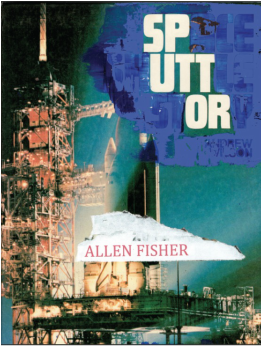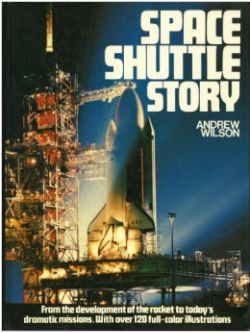|
Allen Fisher's SPUTTOR arrived here last week. As poem, and image object, it is truly astounding. The quality of production makes Veer the perfect platform for its distribution. The entire piece is deftly inscribed and pasted over Andrew Wilson's Space Shuttle Story (1986), which was originally produced in celebration of the ill-fated Challenger space mission, or rather the history of technological advances that made it possible. This was a text that in its own words "trac[ed] the history of the Space Shuttle Program from the early days of rocketry to the destruction of the challenger in 1986". This makes it a strange book in reasoning and conception, as if there is an alternative narrative perpetually simmering in the background. As text and image, the original book traced a process that ended in failure. It has to be assumed that Space Shuttle Story was initially conceived as a celebration of the space race, with the disaster itself something of an afterthought. The idea of 'getting off the planet' and 'space orbits' - which Fisher defined as the main themes of the original text in an issue of Sugarmule - become something much more provocative and rich as a consequence. Language that was once complicit in the infrastructure of the state becomes a living entity subject to a variety of 'transformations'. The beauty of Fisher's work comes in how it reorients, and interferes, with that original text (or how he 'defamiliarizes' its content, to use a term more suited to his other recently reissued text from Veer). The sonorous adulation that defined that mission - coming as it did at the cold wars peak (all 'Red Dawn' and Reaganomics) - is rendered entirely suspect not just by Fisher's poetics but the tragedy that ended the mission itself. SPUTTOR is both SPUTnik and the hope of UTTerance: a stORy inclined to reveal and build on the original monologic narrative by means of the reader's participation and imagination. Alternative possibilities are allowed to emerge from within the tragedy of the dream. The text wonderfully merges the language of progress that defined that mission - as political project and eventual disaster - with alternative histories constantly weaving in and out of the mainframe. Like all of Fisher's work since the seventies the text examines 'where we are', in ways that would be impossible without poetry itself. These are poetic imaginings for a new age, that take into account not only political reality, but the immensity of our human condition. 'There are so many theories', as Anselm Kiefer would put it, '[but] all they describe is our lack of knowledge'. Fisher's text will be a focus of mine over the next few weeks as I try my best to come to terms with it via a series of investigations of both text, image and their intersections. I will begin this shortly with a look at the opening pages. This is an ongoing project, so a bibliography will be provided in my final post. For now I will simply reproduce the 'contents', which go some way to giving an initial glimpse of what is at stake: Human anticpation Human conditions Human health Human colloquium Human legacy 1 Human legacy 2 Human enterprise Human perception 1 Human perception 2 Human predation Human contradiction 1 & 2 Human contradiction 3 Human prospect Human substance Human cosmos Human understanding Human warmth Human loss Read SPUTTOR (2) here Your comment will be posted after it is approved.
Leave a Reply. |
Categories
All
Archives
April 2023
|


 RSS Feed
RSS Feed
